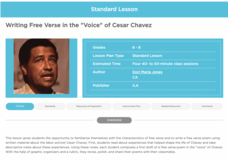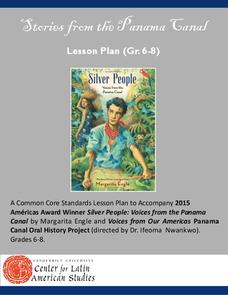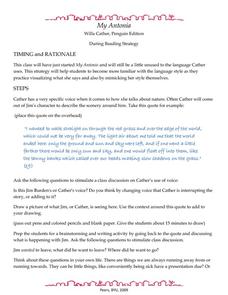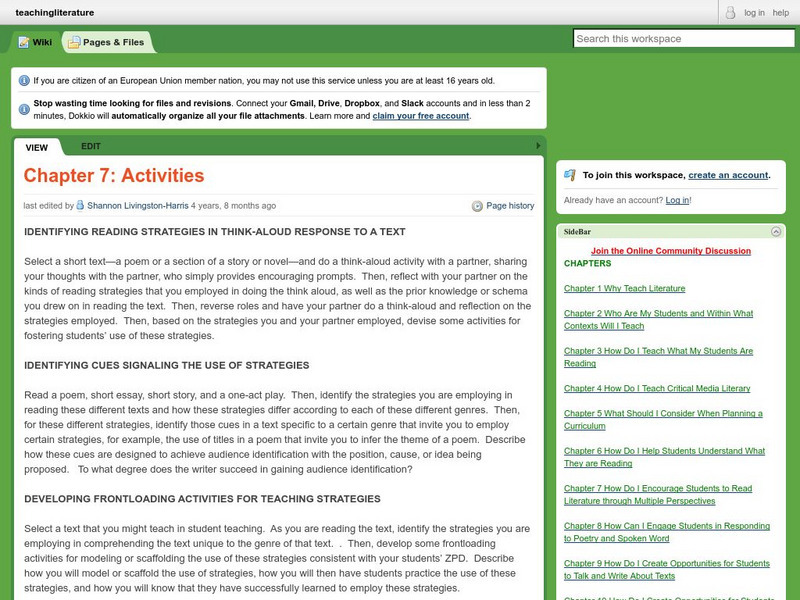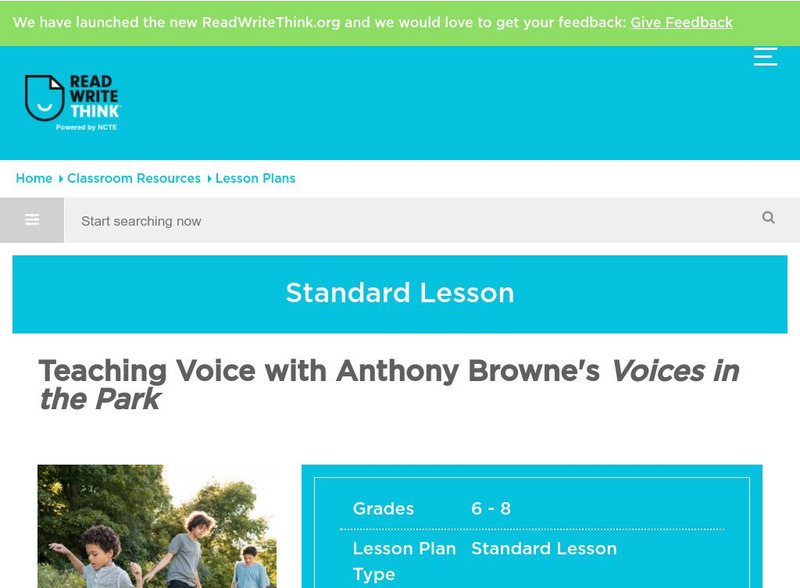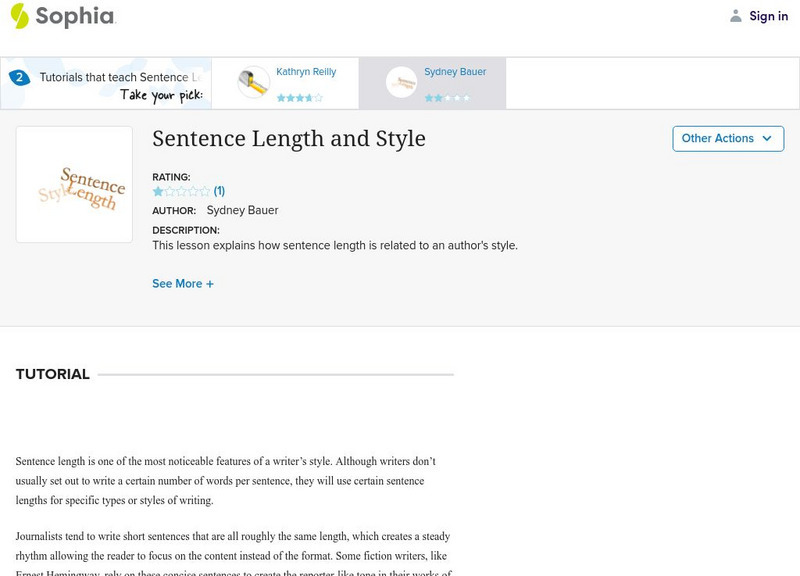Academy of American Poets
Women in Poetry
Imagine linking poetry to technology! Thirty-three lessons comprise a 6-week "Women in Poetry" unit for high schoolers. Class members research women poets, learn how to respond electronically to discussions, write their poems, create web...
PBS
Exploring Identity and Intersectionality in Poetry
Just as Kermit the Frog notes, "It isn't easy being green!" it isn't easy occupying "multiple Identity spaces." Class members read and discuss poems by writers detailing what it is like when their identities are "oppressed."
ReadWriteThink
Writing Free Verse in the "Voice" of Cesar Chavez
Introduce middle schoolers to free verse poetry with a lesson that has young poets read two free verse poems and list the common characteristics of the form. They then read a passage from Cesar Chavez's biography and a free verse poem...
ReadWriteThink
Persuasive Essay: Environmental Issues
Young environmentalists learn how to craft a persuasive essay about an environmental issue they consider important. After studying the components of a persuasive essay and examining a student model, writers brainstorm possible topics and...
Facing History and Ourselves
Finding Your Voice
To begin a study of what it means to be American, high schoolers first consider their own identities. They draw a picture of what they think an American looks like and share their images. Next, they examine an image of the "Flag of...
National Endowment for the Humanities
Literary Genres in “Moby-Dick”
Moby Dick is more than a whale of a tale narrated by Ishmael. A activity studying Herman Melville's classic novel asks readers to examine the different genres the author weaves into his story. Instructors model how to conduct a stylistic...
Thoughtful Learning
Adjusting Your Writing Voice
"Yo, what's up?" "Nuttin!" While such a dialogue might be appropriate between friends, it would be ill-advised in more formal situations. A mini-lesson asks young writers to consider how to adjust the voice they use to bring their...
Vanderbilt University
Stories from the Panama Canal
The stories of the Silver People, the West Indies immigrants hired to work on the Panama Canal, come to life in a lesson about the building of the Panama Canal. Groups research why the canal was built, how it was build, the working...
E Reading Worksheets
Tone: Voice of the Speaker
Tone and mood are easy to use interchangeably—and yet they are very different elements of literature. Help middle schoolers discern between the way a speaker feels about his or her subject and the way the audience is meant to feel with a...
Houghton Mifflin Harcourt
Practice Book: The Boy Who Saved Baseball
An array of reading comprehension, grammar, spelling, and vocabulary activities are at your fingertips with a language arts practice packet. Second, third, and fourth graders work on various skills using reading passages and word banks,...
Novelinks
The Little Prince: Concept/Vocab Analysis
Focus on the literary elements of Antoine de Saint-Exupéry's The Little Prince with a concept analysis sheet. With suggestions and explanations for many of the book's concepts, vocabulary, and other issues that may arise in instruction,...
Curated OER
My Antonia: During Reading Strategy
Home in on the quote on this page to explore setting, the author's and character's voices, and plot in Willa Cather's My Antonia. Pupils draw a picture of what is described in the quote, discuss the content, and make connections to their...
Curated OER
Compare and Contrast Author's Voice
Follow the procedural details here to model for your class how to identify author's voice in two poems, "Since Hannah Moved Away" by Judith Viorst and Mirriam Chaikin's "I Hate Harry." Together, determine voice and the words that reveal...
National Endowment for the Humanities
The Poet's Voice: Langston Hughes and You
Middle schoolers complete a unit of lessons that explore the poetic voice of Langston Hughes. They define voice, read and analyze various poems by Langston Hughes, and complete journal entries for each instructional activity.
Curated OER
Lesson 1: Author's Voice in a Poem
Second graders use the title and text clues from a poem to determine what the author's voice is. In this author's voice instructional activity, 2nd graders participate in a directed instructional activity using the poem "Amazing Bats."...
Curated OER
Author's Voice in Passage
Students explore author's voice. In this literary elements and reading comprehension lesson, students listen to two poems about snakes (included) and identify adjectives and other descriptive words and phrases that help them determine...
Curated OER
Establishing a Strong Authorial Voice, Worksheet 2
Young writers are asked to revise and modify a series of sentences to make them stronger and relay a sense of voice. No definitions or models are given. You might use the activity to check for understanding after a discussion of writer’s...
National Endowment for the Humanities
Neh: Edsit Ement: Lesson 4: Faulkner's the Sound and the Fury
For this lesson plan, students will consider Lesson 4: Faulkner's The Sound and the Fury: Narration, Voice, and the Compson Family's New System. Worksheets and other supporting materials can be found under the Resources tab....
Rick Beach
Teaching Literature to Adolescents, 2nd Edition: Chapter 7: Activities
The textbook entitled Teaching Literature to Adolescents, 2nd Edition contains activities for Chapter 7 reflection. Intended for teachers, this site contains activities that will extend the content from the Chapter 7. Focus of the...
ReadWriteThink
Read Write Think: Teaching Voice With Anthony Browne's Voices in the Park
Contains plans for four lessons that teach students the difficult concept of voice using a book that uses four specific voices: "Voices in the Park" by Anthony Browne. In addition to objectives and standards, this instructional plan...
Sophia Learning
Sophia: Sentence Length and Style
Notes introducing how author's vary the length of sentences in order to express their voice and style. Examples from three literary texts are provided, "Rappaccini's Daughter" by Nathaniel Hawthorne, "Hills Like White Elephants" by...
Read Works
Read Works: Voice 3rd Grade Unit
[Free Registration/Login Required] A series of two lesson plans designed to teach students to recognize words and phrases that support the author's voice in poetry. Lessons are based on the books Where the Sidewalk Ends by Shel...
Read Works
Read Works: Grade 2: Two Lesson Unit: Voice
[Free Registration/Login Required] A set of two lesson plans designed to teach students to describe the author's voice in two poems and compare voice in four short works. Includes ideas for direct teaching, guided practice, and...




